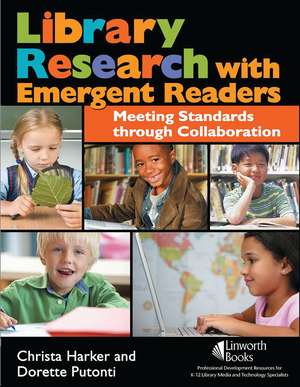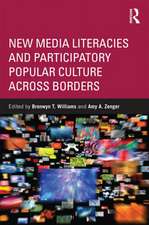Library Research with Emergent Readers: Meeting Standards through Collaboration
Autor Christa Harker, Dorette Putontien Limba Engleză Paperback – 30 apr 2008 – vârsta până la 17 ani
Preț: 236.90 lei
Preț vechi: 288.86 lei
-18% Nou
Puncte Express: 355
Preț estimativ în valută:
45.34€ • 49.23$ • 38.08£
45.34€ • 49.23$ • 38.08£
Carte tipărită la comandă
Livrare economică 23 aprilie-07 mai
Preluare comenzi: 021 569.72.76
Specificații
ISBN-13: 9781586832889
ISBN-10: 1586832883
Pagini: 128
Dimensiuni: 216 x 279 x 7 mm
Greutate: 0.32 kg
Editura: Bloomsbury Publishing
Colecția Linworth
Locul publicării:New York, United States
ISBN-10: 1586832883
Pagini: 128
Dimensiuni: 216 x 279 x 7 mm
Greutate: 0.32 kg
Editura: Bloomsbury Publishing
Colecția Linworth
Locul publicării:New York, United States
Notă biografică
Christa Harker is a librarian at James Bowie Elementary School in Dallas, TX. Dorette Putonti is a librarian at Hamilton Park Pacesetter Magnet in Dallas, TX.
Recenzii
One of the first things that caught my eye as I began to look at this manual was the detailed ideas and worksheets to help librarians and teachers work together. The ways that research benefits emergent readers are also discussed, as well as how research at this level meets national standards. In addition, there are complete units with prepared handouts on animals, earth features, seasons, plants, community helpers, American symbols, and the five senses. They can be used as models for creating units on other topics. Included in the units are an estimated time needed to complete individual projects, detailed directions for their completion, and technology that could be used. There are self-assessment rubrics for students. The manual ends with additional resources that can be used when working with young students. I especially liked the effective ideas, like "prove it," where students are asked to point to a picture or line of text to show the teacher or librarian where they got their facts. A librarian and teacher can easily follow the guidelines in this manual to work together to create effective units for emergent readers. Recommended.
Harker and Putonti, both experienced librarians, have produced a practical guide to providing students in the primary grades with a research experience. The first chapter gives the justification for attempting this feat, with emphasis on the opportunity such activities provide for teacher/librarian collaboration. Specific references as to how such research projects dovetail with AASL's 'Standards for the 21st Century Learner' are given, as are examples from 'Information Standards for Student Learning.' The second chapter provides the step-by-step process that will insure success, with nine specific steps outlined in considerable detail. The remaining seven chapters include a variety of research projects that the authors have tested in their own library situations, each of which includes an overview, integrated content standards, and print and electronic resources. Appendixes provide assessment rubrics, collaborative checklists, and additional resources. An excellent tool for both novice and experienced librarians.
Harker and Putonti, both experienced librarians, have produced a practical guide to providing students in the primary grades with a research experience. The first chapter gives the justification for attempting this feat, with emphasis on the opportunity such activities provide for teacher/librarian collaboration. Specific references as to how such research projects dovetail with AASL's 'Standards for the 21st Century Learner' are given, as are examples from 'Information Standards for Student Learning.' The second chapter provides the step-by-step process that will insure success, with nine specific steps outlined in considerable detail. The remaining seven chapters include a variety of research projects that the authors have tested in their own library situations, each of which includes an overview, integrated content standards, and print and electronic resources. Appendixes provide assessment rubrics, collaborative checklists, and additional resources. An excellent tool for both novice and experienced librarians.

